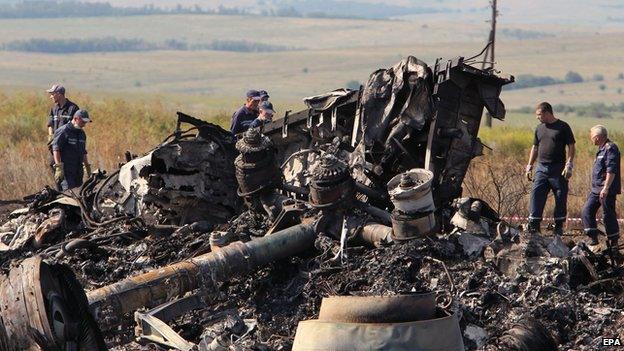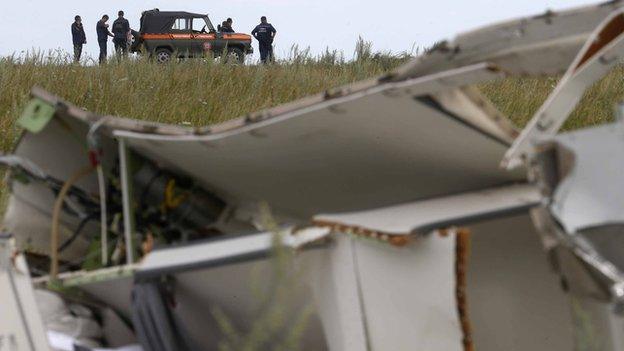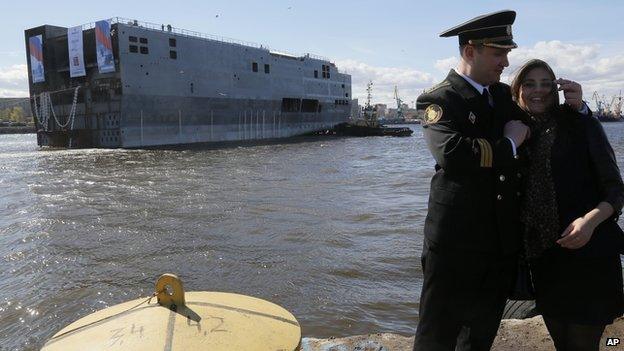MH17 plane crash: EU to widen Russia sanctions
- Published

Bodies have been moved from the crash site after three days of being left in the open
The EU will widen its sanctions against Russia to include more individuals and consider targeting the defence sector, the Dutch foreign minister says.
Frans Timmermans said "unanimous" and "forceful" decisions had been taken on enhanced sanctions against Russia over the Ukraine conflict.
The UK has pushed for the Russian arms sector to be targeted.
Western leaders accuse Russia of arming rebels in eastern Ukraine, and believe they shot down an airliner there.
There is widespread anger over the Malaysia Airlines crash in eastern Ukraine, in which 298 people died.
The sanctions are aimed at forcing Russia to help defuse the Ukraine conflict and put pressure on the rebels to disarm.
A new sanctions list naming individuals and organisations will be drawn up by EU ambassadors by Thursday, Mr Timmermans told reporters after meeting his EU colleagues in Brussels.
He said there was also agreement that the European Commission would look at further measures to be taken against Russia in the fields of defence, concerning "dual-use goods in the field of energy", and in financial services.
But the BBC's Europe editor Gavin Hewitt says it is still unclear if EU leaders will be prepared to accept harm to their own economies in order to punish Russian President Vladimir Putin.

The UN has called for a full international investigation into the crash of Malaysia Airlines flight MH17
'Putin's cronies'
The EU and US have imposed asset freezes and travel bans on some top Russian officials, military commanders and companies since Moscow's annexation of Crimea in March.
The US has gone further than the EU in targeting members of President Putin's inner circle.
Commenting on the EU's enhanced sanctions, UK Foreign Secretary Philip Hammond said "the word is 'cronies': the cronies of Mr Putin and his clique in the Kremlin are the people who have to bear the pressure".
"If the financial interests of the group around the leadership are affected, the leadership will know about it."
Earlier UK Prime Minister David Cameron urged the EU to extend sanctions to the arms sector - a call echoed by Lithuania.
A statement after the talks, external said that by Thursday the EU would prepare "proposals for taking action, including on access to capital markets, defence, dual-use goods, and sensitive technologies, including in the energy sector".
International experts are now examining plane wreckage at the disaster scene in eastern Ukraine and most of the bodies have been moved in refrigerated train carriages to Kharkiv, outside the rebel-controlled area.
The Netherlands lost 193 nationals in the flight MH17 disaster - more than any other country.
The Dutch Prime Minister, Mark Rutte, said attitudes towards Russia had fundamentally changed since the airliner was shot down last Thursday.

Pressure over warships
Earlier Mr Cameron condemned France's sale of two Mistral helicopter carriers to Russia - a deal also criticised by the US.
France hinted that it could suspend delivery of one of the warships to Russia, depending on Russia's attitude to the Ukraine conflict.
Mr Cameron has said there is a "reluctance" among some European countries to take more decisive action against Russia.
Lithuanian President Dalia Grybauskaite said the French warship deal was like the 1930s appeasement of Nazi Germany.
Many EU countries, including Germany and Italy, are heavily reliant on Russian gas.

France is completing the first Mistral warship, but its assembly started in St Petersburg - the stern is shown here
When asked about the Mistral warship deal with Russia, French President Francois Hollande said the first of two ships "is almost finished and must be delivered in October".
The rest of the contract would depend on Russia's attitude over Ukraine, he said.
"But at this point no sanctions have been agreed that would force us to abandon [the contract]," he said. "We're not at that stage yet - we'll see if the Russians behave badly," he said, quoted by French news website Europe 1, external.
A source close to Mr Hollande said: "France, for now, wants the sanctions to be financial, targeted and swift."